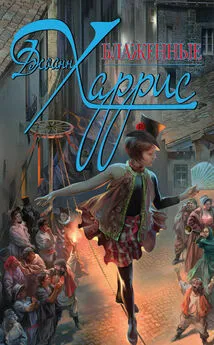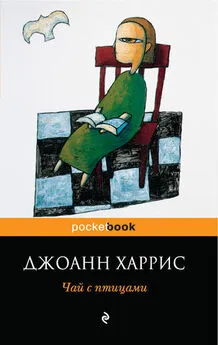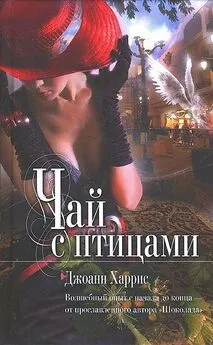Джоанн Харрис - Шоколад / Chocolat
- Название:Шоколад / Chocolat
- Автор:
- Жанр:
- Издательство:неизвестно
- Год:2021
- Город:Москва
- ISBN:978-5-04-117086-8
- Рейтинг:
- Избранное:Добавить в избранное
-
Отзывы:
-
Ваша оценка:
Джоанн Харрис - Шоколад / Chocolat краткое содержание
«Шоколад» – это история о доброте и терпимости, о противостоянии невинных соблазнов и закоснелой праведности. Одноименный голливудский фильм режиссера Лассе Халлстрёма (с Жюльетт Бинош, Джонни Деппом и Джуди Денч в главных ролях) был номинирован на «Оскар» в пяти категориях и на «Золотой глобус» – в четырех.
В формате PDF A4 сохранен издательский макет книги.
Шоколад / Chocolat - читать онлайн бесплатно ознакомительный отрывок
Интервал:
Закладка:
“He’d like to think he’s the only one who can help me out,” she said with satisfaction. “Bad as each other, both of them, clucking about subsidence and damp. They want me out of that house, there’s the truth of it. Out of my nice house and into some lousy old folks’ home where you have to ask permission to go to the bathroom!” She was indignant, her black eyes snapping. “Well, I’ll show them,” she declared. “Roux used to be a builder, before he went on the river. He and his friends will make a good enough job of it. And I’d rather pay them to do the work honestly than to have that imbecile do it for free.”
She adjusted the brim of her hat with unsteady hands.
“I’m not expecting him, you know.”
I knew it was not the same person to whom she referred. I looked at my watch. Four-twenty. Night was already falling. And yet I’d been so sure… That was what came of interfering, I told myself savagely. So easy to inflict pain on others, on myself.
“I never imagined he would come,” continued Armande in that crisp, determined voice. “She’s seen to that all right. Taught him well, she has.” She began to struggle off her perch. “I’ve been taking up too much of your time already,” she said shortly. “I must be – ”
“M-memee.”
She twists around so abruptly that I am sure she must fall. The boy is standing quietly by the door. He is wearing jeans and a navy sweatshirt. He has a wet baseball cap on his head. In his hand he carries a small, scuffed hardback book. His voice is soft and self-conscious.
“I had to w-wait until my m-mother went out. She’s at the h-hairdresser’s. She won’t be back till s-six.”
Armande looks at him. They do not touch, but I feel something pass between them like a jolt of electricity. Too complex for me to analyse, but there is warmth and anger, embarrassment, guilt – and behind it all a promise of softness.
“You look soaked. I’ll make you a drink,”
I suggest, going into the kitchen. As I leave the room I hear the boy’s voice again, low and hesitant.
“Thanks for the b-book,” he says. “I’ve got it here with me.”
He holds it out like a white flag. It is no longer new; but worn like a book which has been read and reread, lovingly and often. Armande registers this, and the fixed look disappears from her face.
“Read me your favourite poem,” she says.
From the kitchen, as I pour chocolate into two tall glasses, as I stir in cream and kahlua, as I make enough noise with pots and bottles to give the illusion of privacy, I hear his voice raised, stilted at first, then gaining rhythm and confidence. I cannot make out the words, but from a distance it sounds like prayer or invective. I notice that when he reads, the boy does not stutter.
I set the two glasses carefully onto the counter. As I entered the boy stopped speaking mid-sentence and eyed me with polite suspicion, his hair falling into his eyes like the mane of a shy pony. He thanked me with scrupulous courtesy, sipped his drink with more mistrust than pleasure.
“I’m not s-supposed to have this,” he said doubtfully. “My mother s-says ch-chocolate makes me c-come out in z-zits.”
“And it could make me drop dead on the spot,” said Armande smartly.
She laughed at his expression.
“Come on, boy, don’t you ever doubt what your mother says? Or has she brainwashed what little sense you might have inherited from me right out of you?”
Luc looked nonplussed.
“I-it’s just what sh-she s-says,” he repeated, lamely.
Armande shook her head.
“Well, if I want to hear what Caro says I can make an appointment,” she said. “What have you got to say? You’re a smart lad, or used to be. What do you think?”
Luc sipped again.
“I think she might have been exaggerating,” he said with a tiny smile. “You look p-pretty good to me.”
“No zits, either,” said Armande.
He was surprised into laughter. I liked him better this way, his eyes flaring a brighter green, his impish smile oddly like his grandmother’s. He remained guarded, but behind his deep reserve I began to glimpse a ready intelligence and sharp sense of humour.
He finished his chocolate but refused a slice of cake, though Armande took two. For the next half-hour they talked while I pretended to go about my business. Once or twice I caught him looking at me with a wary curiosity, the flickering contact between us broken as soon as it was made. I left them to it.
It was half-past five when they both said goodbye. There was no talk of another meeting, but the casual fashion with which they parted suggested that both had the same thought in mind. It surprised me a little to see them so alike, circling each other with the caution of friends reunited after long years of separation. They both have the same mannerisms, the same direct way of looking, the slanting cheekbones, sharp chin. When his features are in repose this similarity is partially obscured, but animation makes him more like her, erasing from them that look of bland politeness which she deplores. Armande’s eyes are shining beneath the brim of her hat. Luc seems almost relaxed, his stutter receding to a slight hesitancy, barely noticeable. I see him pause at the door, wondering perhaps whether he should kiss her. On this occasion his adolescent’s dislike of contact is still too strong. He lifts a hand in a shy gesture of farewell, then is gone.
Armande turns towards me, flushed with triumph. For a second her face is naked in its love, hope, pride. Then the reserve which she shares with her grandson returns, a look of enforced casualness, a gruff note in her voice as she says,
“I enjoyed that, Vianne. Perhaps I’ll come again.” Then she gives me one of her direct looks, reaching out a hand to touch my arm. “You’re the one who brought him here,” she said. “I wouldn’t have known how to do it myself.”
I shrugged.
“It would have happened at some time or another,” I said. “Luc isn’t a child any more. He has to learn to do things his own way.”
Armande shook her head. “No, it’s you,” she told me stubbornly. She was close enough for me to smell her lily-of-the-valley perfume. “The wind’s changed since you’ve been here. I can still feel it. Everyone feels it. Everything’s on the move. Whee!”
She gave a little crow of amusement.
“But I’m not doing anything,” I protested, half-laughing with her. “I’m just minding my own business. Running my shop. Being me.”
In spite of my own laughter I felt uneasy.
“It doesn’t matter,” replied Armande. “It’s still you that’s doing it. Look at all the changes; me, Luc, Caro, the folks out on the river”– she jerked her head sharply in the direction, of Les Marauds – “even him in his ivory tower across the square. All of us changing. Speeding up. Like an old clock being wound up after years of telling the same time.”
It was too close to my own thoughts of the week before. I shook my head emphatically.
“That isn’t me,” I protested. “It’s him. Reynaud. Not me.”
A sudden image at the back of my mind, like the turn of a card. The Black Man in his clock tower, turning the machinery faster and faster, ringing the changes, ringing the alarum, ringing us out of town… And with that unsettling image came one of an old man on a bed, tubes in his nose and arms, and the Black Man standing over him in grief or triumph, while at his back, fire burned.
“Is it his father?” I said the first words which came into my head. “I mean – the old man he visits. In the hospital. Who is it?”
Armande gave me a sharp look of surprise.
“How do you know about that?”
“Sometimes I have – feelings – about people.”
For some reason I was reluctant to admit to scrying with the chocolate, reluctant to use the terminology with which my mother had made me so familiar.
“Feelings.”
Armande looked curious, but did not question me further.
“So there is an old man, then?” I could not shake off the thought that I had stumbled upon something important. Some weapon, perhaps, in my secret struggle against Reynaud. “Who is he?” I insisted.
Armande gave a shrug.
“Another priest,” she said, with dismissive contempt, and would say no more.
16
Wednesday, February 26
When i opened this morning roux was waiting at the door. He was wearing denim overalls, and his hair was tied back with string. He looked to have been waiting for some time, because his hair and shoulders were furred with droplets from the morning mist. He gave me something that was not quite a smile, then looked behind me into the shop where Anouk was playing.
“Hello, little stranger,” he said to her. This time the smile was real enough, lighting his wary face briefly.
“Do come in.” I beckoned him inside. “You should have knocked. I didn’t see you out there.”
Roux muttered something in his thick Marseille accent and crossed the threshold rather self-consciously. He moves with an odd combination of grace and clumsiness, as if he feels uncomfortable indoors.
I poured him a tall glass of black chocolate laced with kahlua.
“You should have brought your friends,” I told him lightly.
He gave a shrug in reply. I could see him looking around, taking in his surroundings with keen, if suspicious, interest.
“Why don’t you sit down?”
I asked, pointing to the stools at the counter. Roux shook his head.
“Thanks.” He took a mouthful of the chocolate. “Actually, I wondered if you’d be able to help me. Us.” He sounded embarrassed and angry at the same time. “It isn’t money,” he added quickly, as if to prevent me from speaking. “We’d pay for it all right: It’s just the – organization – we’re having difficulty with.” He shot me a look of unfocused resentment. “Armande – Madame Voizin – said you’d help,” he said.
He explained the situation as I listened quietly, nodding encouragement on occasion. I began to understand that what I had taken for inarticulacy was simply a deep dislike of having to ask for help. Through the thick accent Roux spoke like an intelligent man. He had promised Armande that he would repair her roof, he explained. It was a relatively easy job which would take only a couple of days. Unfortunately the only local supplier of wood, paint and the other materials needed to complete the task was Georges Clairmont, who flatly refused to supply them to either Armande or Roux. If Mother wanted repairs to her roof, he told her reasonably, then she should ask him, not a bunch of swindling vagrants. It wasn’t as if he hadn’t been asking – begging – her to let him do the work free of charge for years. Let the gypsies into her house and God only knew what might happen. Valuables looted, money stolen… It wasn’t unknown for an old woman to be beaten or killed for the sake of her few poor possessions. No. It was an absurd scheme, and in all conscience he couldn’t?
“Sanctimonious bastard,” said Roux viciously. “Knows nothing about us – nothing! The way he talks, we’re all thieves and murderers. I’ve always paid my way. I’ve never begged from anyone, I’ve always worked?”
“Have some more chocolate,” I suggested mildly, pouring another glassful. “Not everybody thinks like Georges and Caroline Clairmont.”
“I know that.”
His posture was defensive, arms crossed over his body.
“I’ve used Clairmont to do repairs for me before,” I continued. “I’ll tell him I want to do some more work on the house. If you give me a list of what you need, I’ll get it.”
Читать дальшеИнтервал:
Закладка:




![Джоанн Харрис - Земляничный вор [litres]](/books/1072539/dzhoann-harris-zemlyanichnyj-vor-litres.webp)
![Джоанн Харрис - Джентльмены и игроки [litres]](/books/1087279/dzhoann-harris-dzhentlmeny-i-igroki-litres.webp)




